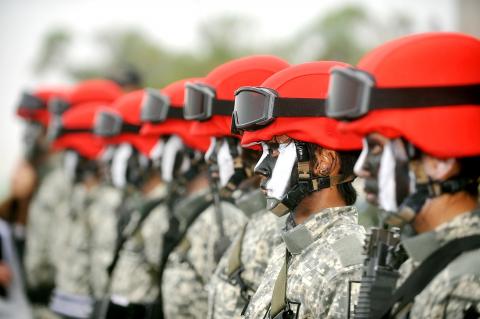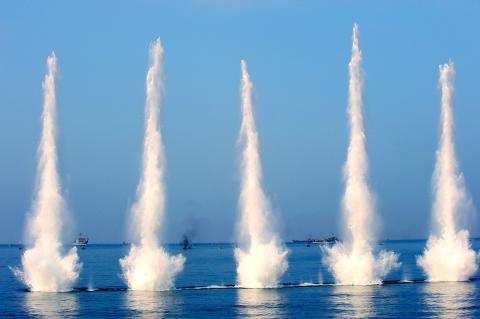The military held war games to drill its paratrooper and airborne defense units at an airbase in Greater Taichung yesterday as part of this year’s five-day Han Kuang series of exercises.
The 50-minute drill, which started at 7:30am at the Ching Chuan Kang Airbase, resembled a scrimmage, albeit with heavy weaponry and military expertise.
Planners divided a total of 2,596 soldiers into two teams of attackers and defenders.

Photo: Liao Yao-tung, Taipei Times
The attack group launched two Indigenous Defense Fighter aircraft to clear the ground. Then, an onslaught of paratroopers, including 206 elite airborne soldiers, jumped out of transport aircraft to take the territory.
At the same time, ground defenders used the weapons at their disposal to repel the invaders. They deployed AH-1W Super Cobra attack helicopters, OH-58D scout and attack helicopters, and physical barriers to block the advances by the paratroopers. In addition, the defenders also released smoke to disorient the airborne troops during their landing.
This drill marked the first Han Kuang exercise in which female soldiers — eight in all — took part in a simulated parachute offensive, the Ministry of National Defense said.

Photo: Chang Chung-yi, Taipei Times
The drill came two days after the military staged another simulation to practice emergency landings and takeoffs on a section of freeway in Greater Tainan, which acts as a runway of last resort if airbases have already been taken out by enemy bombers.
Meanwhile, in other Han Kuang-related action, more than 3,000 troops engaged in an amphibious landing drill in Pingtung County.
At 7am, a fleet of amphibious gunboats approached the coast of Pingtung County and waited for marine specialists to launch bombs that would clear any mines from the waters. Their cargo included marines, M60A3 tanks and other armored vehicles.
When the coast was clear, troops started assaulting the beachhead from their amphibious transports and assault vehicles. At the same time, jet fighters and attack helicopters were also deployed to facilitate the landing operation.
During the offensive, one jeep was seen stuck on the beach and was later rescued by an armored vehicle, a scene that many spectators had thought was a mishap.
When the jeep was pulled onshore, however, the military broadcast said the beach “rescue” operation was “conducted successfully.”
The disabled jeep was reportedly part of the drill.
Chang Shou-ling (張壽齡), a senior official in the Marine Corps, said the rescue challenge was included to simulate a common glitch in these operations — that any landing vehicle could get stuck owing to conditions on the ground.
This year’s Han Kuang military exercises began on Monday and end today.

MORE VISITORS: The Tourism Administration said that it is seeing positive prospects in its efforts to expand the tourism market in North America and Europe Taiwan has been ranked as the cheapest place in the world to travel to this year, based on a list recommended by NerdWallet. The San Francisco-based personal finance company said that Taiwan topped the list of 16 nations it chose for budget travelers because US tourists do not need visas and travelers can easily have a good meal for less than US$10. A bus ride in Taipei costs just under US$0.50, while subway rides start at US$0.60, the firm said, adding that public transportation in Taiwan is easy to navigate. The firm also called Taiwan a “food lover’s paradise,” citing inexpensive breakfast stalls

TRADE: A mandatory declaration of origin for manufactured goods bound for the US is to take effect on May 7 to block China from exploiting Taiwan’s trade channels All products manufactured in Taiwan and exported to the US must include a signed declaration of origin starting on May 7, the Bureau of Foreign Trade announced yesterday. US President Donald Trump on April 2 imposed a 32 percent tariff on imports from Taiwan, but one week later announced a 90-day pause on its implementation. However, a universal 10 percent tariff was immediately applied to most imports from around the world. On April 12, the Trump administration further exempted computers, smartphones and semiconductors from the new tariffs. In response, President William Lai’s (賴清德) administration has introduced a series of countermeasures to support affected

CROSS-STRAIT: The vast majority of Taiwanese support maintaining the ‘status quo,’ while concern is rising about Beijing’s influence operations More than eight out of 10 Taiwanese reject Beijing’s “one country, two systems” framework for cross-strait relations, according to a survey released by the Mainland Affairs Council (MAC) on Thursday. The MAC’s latest quarterly survey found that 84.4 percent of respondents opposed Beijing’s “one country, two systems” formula for handling cross-strait relations — a figure consistent with past polling. Over the past three years, opposition to the framework has remained high, ranging from a low of 83.6 percent in April 2023 to a peak of 89.6 percent in April last year. In the most recent poll, 82.5 percent also rejected China’s

PLUGGING HOLES: The amendments would bring the legislation in line with systems found in other countries such as Japan and the US, Legislator Chen Kuan-ting said Democratic Progressive Party (DPP) Legislator Chen Kuan-ting (陳冠廷) has proposed amending national security legislation amid a spate of espionage cases. Potential gaps in security vetting procedures for personnel with access to sensitive information prompted him to propose the amendments, which would introduce changes to Article 14 of the Classified National Security Information Protection Act (國家機密保護法), Chen said yesterday. The proposal, which aims to enhance interagency vetting procedures and reduce the risk of classified information leaks, would establish a comprehensive security clearance system in Taiwan, he said. The amendment would require character and loyalty checks for civil servants and intelligence personnel prior to